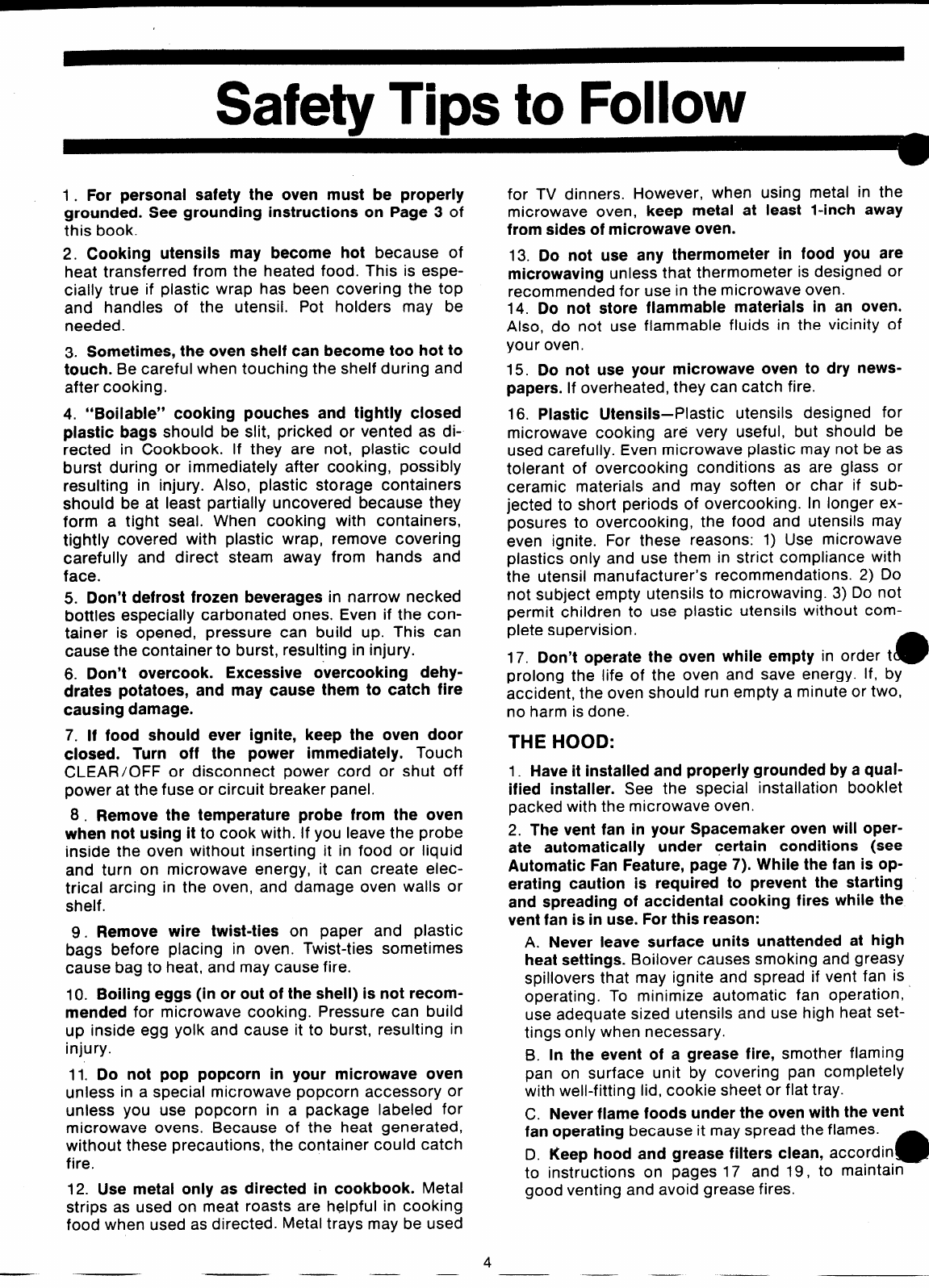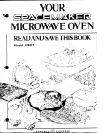
Safetv Tim to Follow
1. For personal safety the oven must be properly
grounded. See grounding instructions on Page 3 of
this book.
2. Cooking utensils may become hot because of
heat transferred from the heated food. This is espe-
cially true if plastic wrap has been covering the top
and handles of the utensil. Pot holders may be
needed.
3. Sometimes, the oven shelf can become too hot to
touch. Be careful when touching the shelf during and
after cooking.
4. “Boilable” cooking pouches and tightly closed
plastic bags should be slit, pricked or vented as di-
rected in Cookbook. If they are not, plastic could
burst during or immediately after cooking, possibly
resulting in injury. Also, plastic storage containers
should be at least partially uncovered because they
form a tight seal. When cooking with containers,
tightly covered with plastic wrap, remove covering
carefully
and direct steam away from hands and
face.
5. Don’t defrost frozen beverages in narrow necked
bottles especially carbonated ones. Even if the con-
tainer is opened, pressure can build up. This can
cause the container to burst, resulting in injury.
6. Don’t overcook. Excessive overcooking dehy-
drates potatoes, and may cause them to catch fire
causing damage.
7. If food shouid ever ignite, keep the oven door
closed. Turn off the power immediately. Touch
CLEAR/OFF or disconnect power cord or shut off
power at the fuse or circuit breaker panel.
8. Remove the temperature probe from the oven
when not using it to cook with. If you leave the probe
inside the oven without inserting it in food or liquid
and turn on microwave energy, it can create elec-
trical arcing in the oven, and damage oven walls or
shelf.
9. Remove wire twist-ties on paper and plastic
bags before placing in oven. Twist-ties sometimes
cause bag to heat, and may cause fire.
10. Boiiing eggs (in or out of the sheil) is not recom-
mended for microwave cooking. Pressure can build
up inside egg yolk and cause it to burst, resulting in
injury.
11. Do not pop popcorn in your microwave oven
unless in a special microwave popcorn accessory or
unless you use popcorn in a package labeled for
microwave ovens. Because of the heat generated,
without these precautions, the container could catch
fire.
12. Use metai oniy as directed in cookbook. Metal
strips as used on meat roasts are helpful in cooking
food when used as directed. Metal trays may be used
for TV dinners. However, when using metal in the
microwave oven, keep metai at least l-inch away
from sides of microwave oven.
13. Do not use any thermometer in food you are
microwaving unless that thermometer is designed or
recommended for use in the microwave oven.
14. Do not store flammabie materiais in an oven.
Also, do not use flammable fluids in the vicinity of
your oven.
15. Do not use your microwave oven to dry news-
papers. If overheated, they can catch fire.
16. Piastic Utensiis–Plastic utensils designed for
microwave cooking are very useful, but should be
used carefully. Even microwave plastic may not be as
tolerant of overcooking conditions as are glass or
ceramic materials and may soften or char if sub-
jected to short periods of overcooking. In longer ex-
posures to overcooking, the food and utensils may
even ignite. For these reasons: 1) Use microwave
plastics only and use them in strict compliance with
the utensil manufacturer’s recommendations. 2) Do
not subject empty utensils to microwaving. 3) Do not
permit children to use plastic utensils without com-
plete supervision.
17, Don’t operate the oven whiie empty in order t
@
prolong the life of the oven and save energy. If, by
accident, the oven should run empty a minute or two,
no harm is done.
THE HOOD:
1.
Have it instailed and properly grounded by a qual-
ified instaiier. See the special installation booklet
packed with the microwave oven.
2. The vent fan in your Spacemaker oven wiii oper-
ate automatically under certain conditions (see
Automatic Fan Feature, page 7). Whiie the fan is op-
erating caution is required to prevent the starting
and spreading of accidental cooking fires whiie the
vent fan is in use. For this reason:
A. Never ieave surface units unattended at high
heat settings. Boilover causes smoking and greasy
spillovers that may ignite and spread if vent fan is
operating. To minimize automatic fan operation,
use adequate sized utensils and use high heat set-
tings only when necessary.
B. in the event of a grease fire, smother flaming
pan on surface unit by covering pan completely
with well-fitting lid, cookie sheet or flat tray.
C. Never frame foods under the oven with the vent
fan operating because it may spread the flames.
D. Keep hood and grease fiiters clean, accordin
a
to instructions on pages 17 and 19, to maintain
good venting and avoid grease fires.
4
———


















